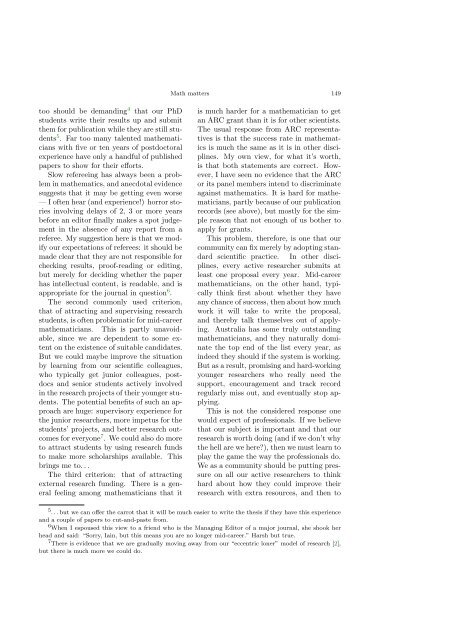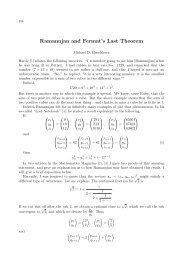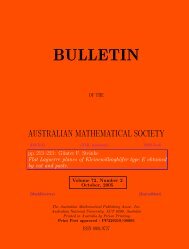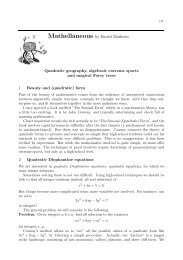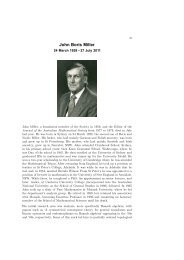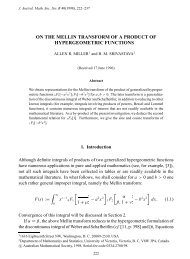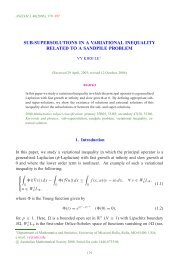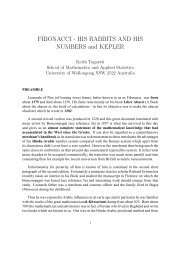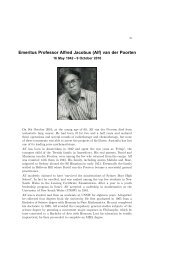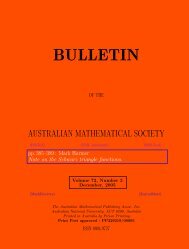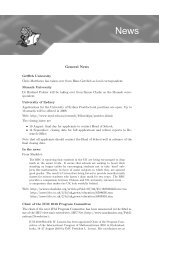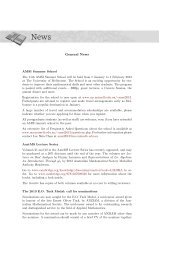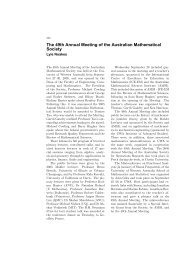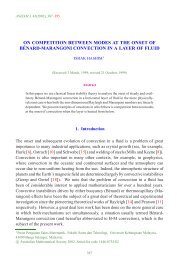Gazette 31 Vol 3 - Australian Mathematical Society
Gazette 31 Vol 3 - Australian Mathematical Society
Gazette 31 Vol 3 - Australian Mathematical Society
Create successful ePaper yourself
Turn your PDF publications into a flip-book with our unique Google optimized e-Paper software.
too should be demanding 4 that our PhD<br />
students write their results up and submit<br />
them for publication while they are still students<br />
5 . Far too many talented mathematicians<br />
with five or ten years of postdoctoral<br />
experience have only a handful of published<br />
papers to show for their efforts.<br />
Slow refereeing has always been a problem<br />
in mathematics, and anecdotal evidence<br />
suggests that it may be getting even worse<br />
— I often hear (and experience!) horror stories<br />
involving delays of 2, 3 or more years<br />
before an editor finally makes a spot judgement<br />
in the absence of any report from a<br />
referee. My suggestion here is that we modify<br />
our expectations of referees: it should be<br />
made clear that they are not responsible for<br />
checking results, proof-reading or editing,<br />
but merely for deciding whether the paper<br />
has intellectual content, is readable, and is<br />
appropriate for the journal in question 6 .<br />
The second commonly used criterion,<br />
that of attracting and supervising research<br />
students, is often problematic for mid-career<br />
mathematicians. This is partly unavoidable,<br />
since we are dependent to some extent<br />
on the existence of suitable candidates.<br />
But we could maybe improve the situation<br />
by learning from our scientific colleagues,<br />
who typically get junior colleagues, postdocs<br />
and senior students actively involved<br />
in the research projects of their younger students.<br />
The potential benefits of such an approach<br />
are huge: supervisory experience for<br />
the junior researchers, more impetus for the<br />
students’ projects, and better research outcomes<br />
for everyone 7 . We could also do more<br />
to attract students by using research funds<br />
to make more scholarships available. This<br />
brings me to. . .<br />
The third criterion: that of attracting<br />
external research funding. There is a general<br />
feeling among mathematicians that it<br />
Math matters 149<br />
is much harder for a mathematician to get<br />
an ARC grant than it is for other scientists.<br />
The usual response from ARC representatives<br />
is that the success rate in mathematics<br />
is much the same as it is in other disciplines.<br />
My own view, for what it’s worth,<br />
is that both statements are correct. However,<br />
I have seen no evidence that the ARC<br />
or its panel members intend to discriminate<br />
against mathematics. It is hard for mathematicians,<br />
partly because of our publication<br />
records (see above), but mostly for the simple<br />
reason that not enough of us bother to<br />
apply for grants.<br />
This problem, therefore, is one that our<br />
community can fix merely by adopting standard<br />
scientific practice. In other disciplines,<br />
every active researcher submits at<br />
least one proposal every year. Mid-career<br />
mathematicians, on the other hand, typically<br />
think first about whether they have<br />
any chance of success, then about how much<br />
work it will take to write the proposal,<br />
and thereby talk themselves out of applying.<br />
Australia has some truly outstanding<br />
mathematicians, and they naturally dominate<br />
the top end of the list every year, as<br />
indeed they should if the system is working.<br />
But as a result, promising and hard-working<br />
younger researchers who really need the<br />
support, encouragement and track record<br />
regularly miss out, and eventually stop applying.<br />
This is not the considered response one<br />
would expect of professionals. If we believe<br />
that our subject is important and that our<br />
research is worth doing (and if we don’t why<br />
the hell are we here?), then we must learn to<br />
play the game the way the professionals do.<br />
We as a community should be putting pressure<br />
on all our active researchers to think<br />
hard about how they could improve their<br />
research with extra resources, and then to<br />
5 . . . but we can offer the carrot that it will be much easier to write the thesis if they have this experience<br />
and a couple of papers to cut-and-paste from.<br />
6When I espoused this view to a friend who is the Managing Editor of a major journal, she shook her<br />
head and said: “Sorry, Iain, but this means you are no longer mid-career.” Harsh but true.<br />
7There is evidence that we are gradually moving away from our “eccentric loner” model of research [2],<br />
but there is much more we could do.


